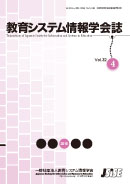Volume 32, Issue 4
Displaying 1-5 of 5 articles from this issue
- |<
- <
- 1
- >
- >|
Preface
-
2015Volume 32Issue 4 Pages 233-235
Published: October 01, 2015
Released on J-STAGE: October 07, 2015
Download PDF (171K)
Original Paper
-
2015Volume 32Issue 4 Pages 236-245
Published: October 01, 2015
Released on J-STAGE: October 07, 2015
Download PDF (884K)
Practical Paper
-
2015Volume 32Issue 4 Pages 246-256
Published: October 01, 2015
Released on J-STAGE: October 07, 2015
Download PDF (697K)
Practical Report
-
2015Volume 32Issue 4 Pages 257-262
Published: October 01, 2015
Released on J-STAGE: October 07, 2015
Download PDF (440K)
Community Plaza
-
2015Volume 32Issue 4 Pages 263-268
Published: October 01, 2015
Released on J-STAGE: October 07, 2015
Download PDF (621K)
- |<
- <
- 1
- >
- >|
